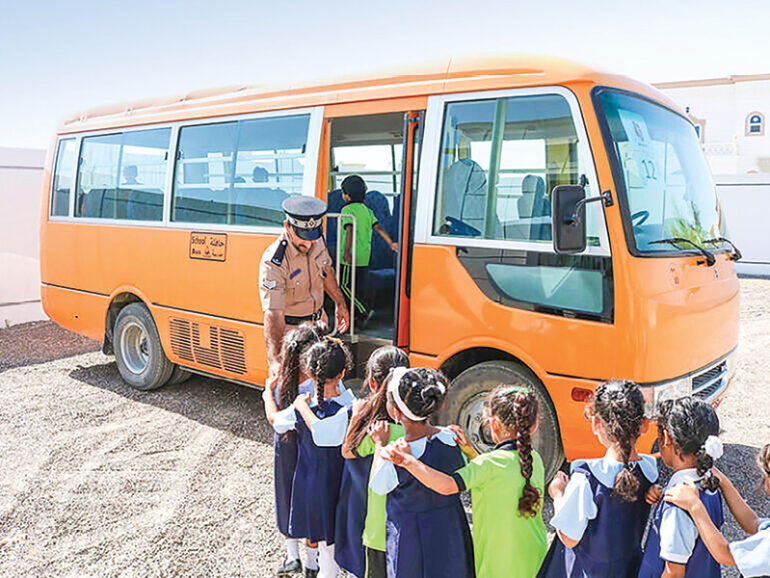
Muscat – The death of a young schoolgirl who was forgotten inside a locked bus on Tuesday in Suwaiq, North Batinah has sent shockwaves across Oman, reigniting public outrage and calls for urgent reforms in school transport safety. The second-grade pupil was found lifeless hours after being left behind – a heartbreaking incident that has […]
Muscat – The death of a young schoolgirl who was forgotten inside a locked bus on Tuesday in Suwaiq, North Batinah has sent shockwaves across Oman, reigniting public outrage and calls for urgent reforms in school transport safety.
The second-grade pupil was found lifeless hours after being left behind – a heartbreaking incident that has struck grief and frustration nationwide, especially as similar tragedies have occurred in the past. Citizens, parents and safety experts are now demanding stricter inspections, wider use of technology and tougher accountability across all schools.
Khalid al Jahwari, a parent, expressed the anguish felt by many. “May God have mercy on her soul and give her family strength,” he said. “We’ve seen this happen before – and it’s unacceptable. Every driver must be required to inspect the vehicle before locking it. Even something as simple as leaving a window slightly open could make a difference.”
Shaimah al Balushi called for better use of technology to prevent such tragedies. “Many school buses already have surveillance cameras and emergency buttons – tools that can save lives if used properly,” she said. “Students should be trained to use these systems. It’s not expensive – it just requires monitoring and commitment.”
Others pointed to a pattern of recurring negligence. “Some drivers rush through their routes and fail to check the bus before leaving,” said Abu Abdullah Ahmed al Rawahi. “This lack of attention is dangerous and must be dealt with firmly. There should be legal consequences for such negligence.”
Safety experts, meanwhile, have proposed a comprehensive overhaul of the system, including the installation of motion and heat sensors that trigger alarms if movement is detected inside locked buses, alongside continuous driver training and closer supervision by schools.
Occupational safety specialist Khalil al Rawahi recommended introducing a structured, documented inspection process. “Every school should hire dedicated safety supervisors,” he said. “Drivers must inspect their buses every morning and afternoon, signing off to confirm they’re clear. These reports should be collected regularly, and any violation must carry legal accountability.”
Yaqoub al Shukri noted that financial pressures on drivers could also contribute to lapses. “Some drivers take on extra work to make ends meet, which leads to fatigue and negligence,” he said. “The Ministry of Education must ensure that school transport is managed professionally and that safety is prioritised over convenience.”
Others have suggested increasing human supervision on buses. “We have nearly 800,000 students and around 32,000 school buses,” said Abu Azan Ahmed al Shaidi. “Each bus needs a dedicated supervisor. That’s 32,000 jobs that could prevent such tragedies from happening again.”
Safety expert Nasser al Hosni said the tragedy must serve as a wake-up call. “This isn’t just about procedures – it’s about culture and responsibility,” he noted. “We need a strict checklist system, better coordination between schools and parents, and technology-supported tracking to ensure every child’s safety. Awareness and accountability are key.”
Hosni added that public awareness campaigns must reinforce shared responsibility among all stakeholders – drivers, schools and parents alike – to ensure such a tragedy never happens again.


 MoH wins award for AI-powered early detection of Diabetic Retinopathy
MoH wins award for AI-powered early detection of Diabetic Retinopathy
 Oman welcomes Gaza ceasefire agreement
Oman welcomes Gaza ceasefire agreement
 Employers must report work injuries within 24 hours: MoL
Employers must report work injuries within 24 hours: MoL
 Oman studies private sector role in managing agricultural cities
Oman studies private sector role in managing agricultural cities
 RO2.6mn project to develop Al Saleel Nature Reserve signed
RO2.6mn project to develop Al Saleel Nature Reserve signed
 Oman to host Horseback Archery World Cup qualifiers from Oct 26
Oman to host Horseback Archery World Cup qualifiers from Oct 26